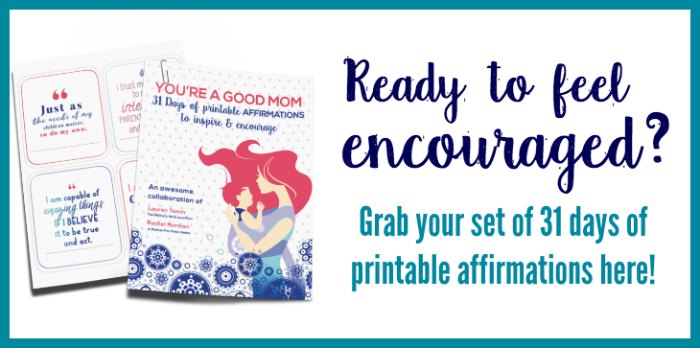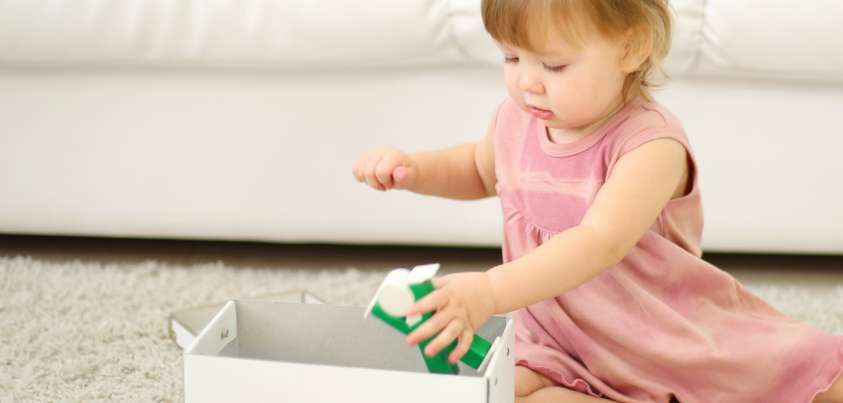1 Year Old Baby and a Newborn

In a way, I felt like I was dying a slow death. This was supposed to be a joyful and harmonious time in our lives. Yet, caring for a toddler and newborn challenged me in ways I never expected.
I used to get my toddler fixed up with an activity and then sit down to nurse the baby. I'd finally have her settled and drifting off to dreamland, and some seemingly minuscule thing would go wrong with my toddler's toy, sending him into a full-blown toddler tantrum .
Now the toddler and newborn were both screaming. Each diligent effort I put into keep the peace was undone in a matter of seconds.

post contains affiliate links
Real solutions for parenting a toddler and newborn.
You are parenting two children who are very demanding in completely different ways. Your 2-year-old isn't listening because he's undergoing the greatest brain development of his life.
Then there's the baby. She has needs too: feeding, sleeping, comforting, bathing. The change from the womb to the outside world is as challenging for her as it is for you.
You want to meet the needs of both children, but they both seem to simultaneously demand your attention, leaving little room for peace and harmony. Not to mention the whole jealous sibling thing…
Here are seven REAL solutions to common parenting challenges during the toddler and newborn phase:
Challenge #1: Toddler acts aggressively towards newborn.
It never surprises me when an older sibling (especially a strong willed toddler) acts aggressively towards a newborn sibling. Toddlers experience a big life change when a newborn baby comes into their world. Everything that was once theirs is now shared, including mom.
You can help your toddler learn how to interact peacefully through simple coaching. I almost always use a Language of Listening approach in these types of situations.
When a toddler acts aggressively, you want to calmly, yet confidently intervene using the least amount of physical boundary to keep both kids safe. This may be a hand or an arm to prevent your toddler from doing harm. Then you can start coaching your child to make a better choice. It might sound something like this:
"You really want to bite something right now. You can bite this pillow. Or you can bite this toy."
"You are getting very close to your sister. She doesn't like it. Those touches are too rough. You can hit this pillow. Or you can hit the chair."
You can also point to the object that is safe for your child to bite or hit. Non-verbal communication works brilliantly with emotionally revved toddlers.
Each time your toddler makes a better choice, hitting, biting or kicking an object rather than his sibling, name those strengths.
"You hit the chair instead of your sister. That shows self-control."
"You bit the pillow instead of the baby. That was a safe choice."
By redirecting your child's anger and frustration to a better choice, you help them release all the pent up emotion while still keeping both kids safe.
Related: 15 Best Ways to Manage Aggressive Behavior in Toddlers
Challenge #2: Toddler and newborn keep you from getting out the door.
During big life changes, kids rely on routines, rhythms and schedules more than ever. Keeping a consistent routine will anchor your child and breed cooperation throughout the day.
- Prepare as much as possible the night before, packing the diaper bag, setting out clothes, etc.
- Estimate how long it will take you to leave the house in the morning, then double it.
- Follow the same morning and bedtime routine (when possible) to help your kids know what to expect.
Related: Get my free email series on creating a routine that works!
Challenge #3: Toddler acts like a baby.
Once kids reach the toddler years, we often hear parents start using phrases like "C'mon, you're a big boy!" when toddlers try and act like a baby.

Unfortunately, many parents find that this doesn't gain cooperation from the toddler, nor end the power struggle. And here's why:
Toddlers experience overwhelming feelings when a newborn is introduced to the family. They see the person they love most in the whole wide world shifting their attention to a new, seemingly more important little person.
In an attempt to re-gain your love and attention, a toddler may act like a baby. Possibly on the floor of the grocery store, while you're checking out. Not that I have personal experience.
Your toddler needs your help to process. An easy way to do this is to–lightbulb moment–allow your child to act like a baby during a safe and convenient time.
Set aside 15-30 minutes to play with your toddler when your spouse is around or your newborn is napping and allow your toddler to act like a baby. Make a game out of it. Rock him, feeding him, coddle him–just like he is a baby for 15-30 minutes.
There's a good chance this little play session will be enough to fill his connection tank, help him process, and encourage him to act more like a "big boy" in public.
Related: Two Words That Will Tame Temper Tantrums – Every Time
Challenge #4: Toddler is jealous of the newborn.
This is so normal and expected. For your child's entire life, he ruled the roost. He was your pride and joy, and there were no other children getting in the way.
Now, a baby is present. And not only are you focusing on the baby, you aren't feeling all that patient with your toddler because–woah–you just had a baby.

Much of a toddlers acting out during this time is related to intense emotions around the change. You can help your child process and move forward using empathetic parenting . It may sound something like this:
"You wish everything would go back to the way it was before. You wish you had mommy all to yourself and that the baby wasn't here. Now, mommy takes care of the baby and you want to play. This isn't going the way you wanted it to. This is hard."
You can change the words to suit. The most important thing is to empathize with your child's situation and help them feel heard, even if it seems illogical to you.

Challenge #5: Toddler is curious about breastfeeding / bottle feeding.
Hey…no worries here. Embrace the curiosity. Use real names for body / bottle parts (nipple, breast, areola, bottle) and allow your toddler the chance to understand.
The more you explain and share, the more you will quench your child's curiosity, and he will move on to more interesting things–like eating stale crackers off the floor.
You can also allow your toddler to breastfeed / bottle feed a doll. This is incredibly innocent for both boys and girls. And you can also confidently explain, "This is how the baby eats. You eat drink with a cup and eat with a spoon. The baby eats with a breast / bottle."
Challenge #6: Toddler won't share anything with the baby.
This goes back to jealousy from Challenge #4. All the toys and things that your oldest child had in the home was perceived as theirs.
Now that the baby is present, the child still thinks all the toys, baby's toys, baby's blankets, etc. belong to him. This is normal and expected with the toddler and newborn transition.
When it seems like sharing will never occur, remember that fair does not mean equal . Your toddler may take a toy from the baby, but in truth, the baby may enjoy and learn just as much from watching the toddler play with the toy.

You can coach your child in these sharing situations using a Language of Listening approach. It may sound something like this…
"You took her toy. She doesn't look very happy. See her face. She's frowning and seems sad. She doesn't have anything to play with."
Then pause for a few seconds and allow your child to correct their own behavior. If he doesn't self correct, offer him something he can do.
"You can give her the toy back. Or you can find another toy she might like."
When your toddler finds a solution to the problem and both kids are happy, name those strengths.
"She likes the toy you gave her. She's looks happy. You found a way to make it work."
Challenge #7: Toddler regresses in sleep, potty training, mealtime.
This goes back to challenge #3 when your toddler acts like a baby, which you could also view as regression.
Your toddler is looking for confident leadership more than ever. Kids test boundaries, looking for you to show them what the rules are. During a very chaotic time in their lives, they want to know that you've got this!
Help your toddler sleep:
- 2 Year Old Sleep Regression Explained! Why It Happens and How to Fix It
- 2 Year Old Sleep Schedule That Works Every Time
- Best 1 Year Old Sleep Schedules from Real Mamas
- How to Help Your Toddler Fall Asleep Fast
Help your baby sleep:
- Top 10 Newborn Baby Sleep Tips to Help You Get More Sleep
- 8 Infant Sleep Facts Every Parent Should Know
- How to Help Baby Nap Better
Help your toddler potty train:
- Potty Train in a Weekend
- How to Potty Train a Toddler
Help with mealtime regression:
- How to Get Kids to Listen at the Dinner Table Without Bribery
- The Day I Quit Dinner Time Battles
- How Much and What Should a Toddler Eat
- 3 Must-Do Things When Your Toddler Refuses Green Vegetables
Remember this is normal.
During a time when you were hoping to enjoy a very peaceful and smooth transition, life can feel very chaotic for everyone in the family.
I remember feeling like there was nothing I could do to keep everyone happy all the time. But the hard parenting truth is this: it's not our job to make our kids happy. It is our job to meet their healthy needs for experience, power and connection and to offer the most unconditional love.
Outside of that, we can try to "control" and "manage" and never see the results we truly want. Happiness comes from within the child once their needs are met.

Print this free toddler listening checklist.
This post comes with a free printable checklist to help with toddler listening. I always have the hardest time remembering these phrases. This printable simplifies it!
Here is a sneak preview…
Download Your Free Printable
- Download the checklist. You'll get the printable, plus join 37,000+ parents who receive my weekly parenting tips and ideas!
- Print. Any paper will do the trick, but card stock
would be ideal.
- Place it on your refrigerator. Check things off as you go and don't forget a thing!
Want more on parenting?
- 5 Unspoken Truths About Being a Stay at Home Mom
- How to Help Your Toddler Transition After a New Baby
- Top 10 Newborn Baby Sleep Tips to Help You Get More Sleep
- The Tantrum Taming Tip Most Parents Don't Know
- How to Calm a One Year-Old Tantrum Down in Minutes
I've created a free email series just for you! If you are struggling with finding a routine, rhythm or schedule, this email series will help you find one that will work for YOUR family. Yes, really. I've seen my sample routines work time and time again for parents. I know it can work for you too.
This free email series will help you:
- Free sample routines for your child
- Best morning routine tips and tricks your kids will actually follow
- All-time favorite parenting hacks for getting more cooperation at bedtime
- Step-by-step guide for using a printable daily schedule with kids
Click here to sign up!
Are you new to this community? Start here, friend.
Source: https://themilitarywifeandmom.com/parent-demanding-toddler-and-newborn/
0 Response to "1 Year Old Baby and a Newborn"
Post a Comment